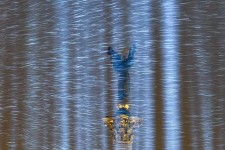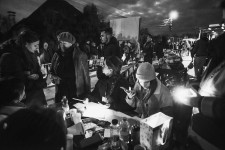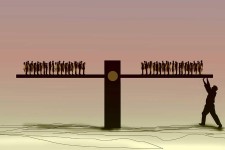What Putin is after in the Black Sea again
Although Russia has suffered some notable defeats in the Black Sea since the outbreak of war against Ukraine, it has, again, increased its military presence in the area. In a recent Facebook post, the Southern Operational Command - a unit of the Ukrainian Army Forces - wrote that Russia has deployed six new missile carriers and two submarines in the Black Sea. The post states that the additional ships can carry up to 40 Kalibr missiles and points out that the threat of missile attacks from these ships is "extremely high". So what could be Russia's reasons for returning to the Black Sea with new military forces? The US publication Newsweek offers a possible answer in an analysis published on Thursday.
What Kharkov could look like after the war
Max Rozenfeld, a 46-year-old architect who began organizing walking tours of Kharkov for tourists several years ago, spent a great deal of his time during the war imagining how the city destroyed by Putin's army could be rebuilt. The city tours made Max a well-known name in Kharkov. Now Max is part of a team led by renowned architect Norman Foster, to whom the mayor of Kharkov, Yhor Terekhov, has commissioned a plan to rebuild the city. In a recent press conference, discussing the master plan, Foster used the word "fortress". The vision he outlined was grandiose. It included, among other things, restoring the largely bombed-out regional administration building as a functional monument, similar to what Foster had done with the former Reichstag building in Berlin, covering it with a giant glass dome. The New Yorker caught up with Max Rozenfeld and he tells us his story, ideas and plans for the future of Kharkov.
"We sent 400 men to Mongolia to avoid war"
Romanian journalist Răzvan Sibii interviewed Mariya Vyushkova, a Belarusian activist and researcher at the University of Notre Dame in the United States, about Russian propaganda and her organisation's attempts to help Belarusian ethnics to not go to war. The Bureatis are a predominantly Buddhist minority in the south-eastern Russian Federation related to the Mongols, whom both Russians and Westerners call " the most cruel soldiers". Read the interview the activist Mariya Vyushkova gave to the US-based Romanian journalist, published recently in the daily Libertatea.
Stop the illegal deportation of Ukrainian children!
Ukrainian authorities claim to have identified at least 19,544 children who have been deported to Russia so far. The abducted children are growing up, their features are changing and facial recognition techniques may well be inadequate. Young children may forget their biological parents, their hometowns, many destroyed by Russian bombings, and the phone numbers of loved ones, says journalist Anna Husarska, in an editorial published Thursday by the Washington Post. Russian state TV, social media posts and the Kremlin's own announcements portray the crime as a compassionate rescue mission, but the abducted children may be subject to systematic re-education, she says. She argues that more mechanisms have to be devised to track this ongoing monstrosity.
A book-like city
The people of Lviv like to call their city "the cultural capital of Ukraine". Russian aggression made that a reality for a while: the country's entire cultural elite came flocking to the city, crowding the streets and cafés. Lviv, however, had become a haven for plebeian rebels from the time of the Soviets. This tradition remained very much alive. Novelist Andrey Kurkov writes for The Guardian about how this spirit survives, comparing the city to a leather-bound historical adventure novel.
The criminal culture that drove the Russian society into militaristic madness
Many Russian advocates and supporters of the war express a chilling desire for violence and favour radical solutions to solve the "Ukrainian question". How else could be explained the brutalization of an entire segment of the Russian society? How is it possible that violence, cruelty and aggression, which are usually repressed in human nature, have surfaced so brazenly? To understand the reasons behind this change, we must first look at those who came to power during the post-Soviet transition, argues journalist Svetlana Stephenson, in an article published recently on themoscowtimes.com.
Reviving a café in Bucha
On February 24th last year, Yuliia Nichvoloda and her family were in Bucha. They moved here in 2018, and in 2021 they opened a cafe, Jul's Coffee, that became popular among families with children. Yuliia also started brewing her own coffee, but a week after the Russian occupation, they had to leave. The café's premises were destroyed, the roof shifted by five centimetres (two inches), the walls cracked, and inside, the Russians destroyed the dessert cabinet and almost all the equipment. Over the summer, Yuliia managed to return to Jul's Coffee, restore it and bring her business back to life.
Leaked Ukraine arming info comes under US investigation
The US Department of Defense is investigating who is responsible for a potentially damaging leak of secret documents revealing efforts made by NATO allies to strengthen Ukraine's forces. The leak included screenshots of classified military documents, later on posted on Twitter and Telegram. In an interview with SkyNews, Philip Ingram, a former British military intelligence and security officer, talks about the leak revealing the reinforcement of Ukrainian military ahead of a new offensive against Russia. He declared the documents " doctored the Russian casualty figures to 17,500, and that the original document, if itself accurate, amounted numbers considerably higher than that".

















